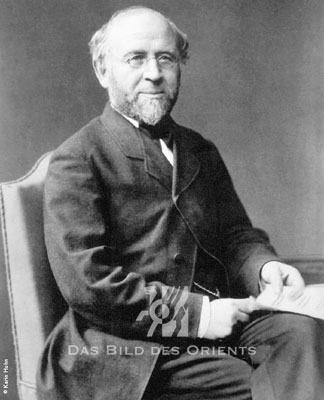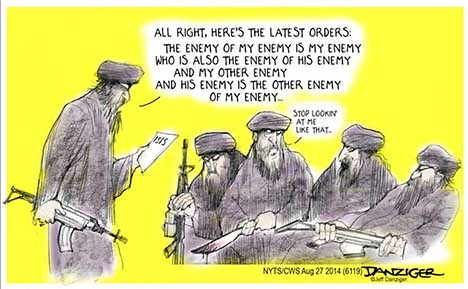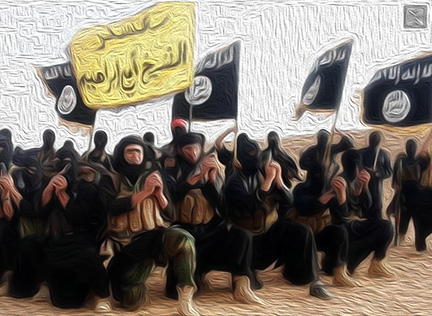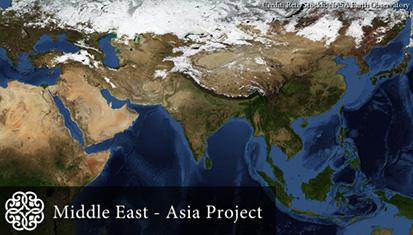
Here is an excellent piece by Bilal Ahmed taking the major media outlets to task for their profound ignorance of Yemen.

Here is an excellent piece by Bilal Ahmed taking the major media outlets to task for their profound ignorance of Yemen.

Johann Gottfried Wetzstein (1815 – 1905)
by Christoph Rauch, H-Net
Arabic manuscripts and Oriental studies: Symposium on the occasion of the 200th birthday of Johann Gottfried Wetzstein.
The international symposium “Studies on Johann Gottfried Wetzstein (1815-1905): Manuscripts, Politics and Oriental Studies†will be held at Staatsbibliothek zu Berlin from 19th to 21st February 2015. (Venue: Potsdamer Strasse 33, 10785 Berlin)
The symposium will be inaugurated Thursday, 19th February 2015, 6:00 PM with a keynote lecture by François Déroche (Paris): “The Qur’anic collections acquired by Wetzsteinâ€; and a musical-literary program by Claudia Ott and her ensemble. Furthermore, some original documents and manuscripts related to Wetzstein will be exhibited at the opening.
If you plan to attend the conference please register before 31st January at the secretary of the Oriental Department, Mrs. Muenchow, orientabt@sbb.spk-berlin.de.
The symposium is generously supported by the Fritz Thyssen-Stiftung and the Verein der Freunde der Staatsbibliothek e.V.; and is organized in cooperation with the Oriental Institute of Leipzig University.
Here is the list of contributions in alphabetical order:
Ibrahim Akel (Paris), Wetzstein in Arabic sources and remarks on some manuscripts from his collections
Kaoukab Chebaro and Samar El Mikati El Kaissi (Beirut), Manuscript ownership and readership at the American University of Beirut at the turn of the 20th century
Alba Fedeli (Cambridge), Tischendorf and the Mingana Collection: Manuscript acquisition and Qur’Änic Studies
Ludmilla Hanisch (Berlin), Semitic studies at the University of Berlin during Wetzstein’s lifetime.
Michaela Hoffmann-Ruf (Bonn), The Wetzstein collection at Tuebingen University Library – its history, its content and its reception in Oriental Studies
Ingeborg Huhn (Berlin), Some remarks concerning the official correspondence of Johann Gottfried Wetzstein
Robert Irwin (London), The Arabist and Consul in Damascus Sir Richard Burton and the problematic nature of his translation of The Thousand and One Nights
Continue reading Symposium at Berlin State Library

Graphic images of Shaimaa al-Sabbagh, an Egyptian activist who was shot and killed at a peaceful rally in Cairo on Saturday, sowed outrage on social networks;
Al Youm Al Saabi /Reuters
There is a phrase that sometimes says it all: “All hell has broken loose.” For anyone who knows the history of humanity, this is a sentiment that could be offered in any age. There is still “hell to pay” for some people on every corner of the globe. And it is not necessary to wait until “hell freezes over” to see or experience “hell on earth.” You can take your pick of hellish acts just in the last few days: a beheading here, an assassination there, a drone bomb here, a cluster bomb there, a suicide bomber here, a rape there, and the list goes on. The world’s attention was focused for the media minutes of a top story just a couple days ago when Yemen’s President Hadi and his entire government resigned, followed by the death of the aging Saudi monarch and leaving the Paris bombings in the dust (to be dusted off as needed ad infinitum by the Islamophobic surge sweeping Europe and shariahphobic America). Now there is the photo above: a woman protesting the abuse of an abusive dictatorial takeover in Cairo, a woman bringing flowers to the victims of a previous killing spree.
Look at this picture and you realize that talk of hell in the hereafter is not a comfort for those of us who find hell in the here and now. If an evil person will “get his” (I don’t know of that many women who create the kind of hell going on hourly and daily in the Middle East today) one day, it does not breathe life back into those whose lives have been taken away. Look at this picture and tell yourself this could be your mother, your sister, your wife or your best friend. Look at this picture and realize that this could be you. You may be far from this violence, this unleashed hellfire, this madness, this perversion of every positive value religions teach. You can look away, of course. You can see it as just another picture of which there are now millions, blood-soaked body parts unrecognizable. You can walk away, shaking your head, saying it can’t happen where you are. It may not, but it will continue whether you care or not. It is true that your tears will not raise the dead and protect the innocent. But shedding tears is the best way to respond to such terrible spilling of blood and still live with yourself as a human connected to other humans.
If I believed the hype of a literal hell and lake of fire, I would hope that those who commit acts of hell on earth would be greeted with automatic entry into the imagined hell of the hereafter. But those who do such despicable acts to fellow human beings are already chained to the hell they create for others. And the hell on earth is the only one that matters on earth. Hell is not in the hereafter; it is too powerful here and now to need a future.

One political cartoon sums up the problem with both ISIS and the current crisis in Yemen…

President Hadi of Yemen, left; King Abdullah of Saudi Arabia, right
In the space of 24 hours two countries on the Arabian Peninsula have seen a change, or at least anticipated change, in leadership. Yesterday President Hadi of Yemen, his Prime Minister Khaled Baha and the entire cabinet resigned after bowing to demands made by the Huthi leadership. The complicated political system ensures or at least suggests that he must remain in power for at least three months, although what power he actually has is severely limited. Not long after midnight King Abdullah of Saudi Arabia passed away at the estimated age of 90. The new Saudi monarch is Crown Prince Salman bin Abdulaziz Al Saud, who is 79, with Muqrin Bin Abdulaziz as the new crown prince. Given the fact that Sultan Qabus of Oman is in his mid 70s further change is possible as the years roll by. Qatar and the Emirates have relatively young rulers, so their stability does not appear to be in question.
Yemen is in free fall politically. The Huthis have taken control of most of the northern highlands and the capital city Sanaa, while they continue to battle local tribes in Marib and the Jawf. Hirak has, at least in spirit, seceded from the once-touted wahda. Al-Qaeda continues its attacks on Yemen’s military and the Huthis, while there are now reports that ISIS/ISIL is trying to muscle into Yemen as well. Hadramawt has also removed itself from any central authority. Only Socotra remains isolated from the potential for violence. This political quagmire is even murkier due to the behind-the-scenes (and at times quite overt) maneuvering of former President Ali Abdullah Salih, who remains a potent force and appears to have ambitions of regaining power. Yemen has no functioning government, the economy has ground to a halt, foreign aid from the Saudis has all but ceased and there are daily clashes that take the lives of ordinary Yemeni citizens. Yemen has not become another Iraq or Syria, but it is teetering on the brink. Continue reading Yet more change in Arabia

By Amir Hussain, UCObserver
So, what do you think about ISIS?†The question was posed at the end of September by an agnostic colleague at the Jesuit university in Los Angeles. The query was directed at me, no doubt, because I’m the lone Muslim theology professor on staff. And I’m not sure how to respond or what else I can say except that members of the Islamic State of Iraq and Syria are horrific. I also can’t imagine my colleague asking me a comparable question — “What do you think about the Nazis?†or “What do you think of clergy who sexually abuse children?†— and expecting any kind of nuanced answer. I put his question aside.
A couple of weeks later, I was driving home from visiting friends in Santa Barbara when I heard that Warrant Officer Patrice Vincent had been deliberately run over and killed in Saint-Jean-sur-Richelieu, Que. Two days after that, while I was in an airline lounge in Chicago, word flashed across the TV monitors that Cpl. Nathan Cirillo had been shot dead while he guarded the National War Memorial in Ottawa and that the assailant was killed in a hail of gunfire in the corridors of the Parliament Buildings. It turned out that both murderers were self-radicalized converts to Islam. I was horrified.
The October attacks brought back to mind my colleague’s question about ISIS. Perhaps, when he asked, he wasn’t looking for nuance but context. Perhaps he wanted to better understand what motivates and inspires their evil, where the movement came from, how they are able to export their ideologies to troubled young men and women around the world, and how worried we North Americans should be about their threat to us.
My response is the same now as it was before. As shocking and frightening as incidents of “homegrown terrorism†may be, we must keep one fact in mind: the primary targets of Muslim fanatics are much more likely to be other Muslims than non-Muslims. Their main purpose is to force their own skewed version of Islam onto other Muslims. In the same way that Ebola is a serious threat to West Africans, not to North Americans, ISIS is a serious threat in Iraq and Syria, not here in North America. Personally, I’m much more concerned about Islamic fundamentalism in general than I am about ISIS specifically. Continue reading The outer edges of Islam

The Middle East-Asia Project (MAP) is an initiative undertaken by the Middle East Institute which is designed to serve two broad objectives:
1. To promote awareness and understanding of the multidimensional relations between the Middle East and Asia by providing information and analysis on cross-regional economic, political, security, and social/cultural interactions and their implications; and
2. To foster collaborative research and other activities regarding Middle East-Asia relations through establishing an online community of experts and forging institutional partnerships.
The Cyber Library contains publication details, abstracts and live links to full text versions of previously published works on Middle East-Asian affairs organized by country and by topic/issue.
The Experts Directory contains the profiles and contact details of a worldwide network of academics, business leaders, diplomats, journalists, researchers and other practitioners affiliated with the MAP.
The Infographics project element consists of periodically updated charts, tables and timelines depicting key trends and developments in trade, investment, migration, and other spheres of cross-regional activity.
The Publications element is organized as follows: Continue reading Middle East and Asia Project

by David Miller and Tom Mills, Open Democracy, January 15, 2015
Terrorism “expert” Steve Emerson is more than a comic buffoon. His claims about no-go zones for non-Muslims in European cities are just part of a wealthy network spreading Islamophobia across the west.
On Sunday, the veteran terrorism expert Steven Emerson appeared on Fox News to discuss Europe’s Muslim population and claimed that Birmingham was an example of a ‘totally Muslim [city] where non-Muslims just simply don’t go in’. The claim led to him being ridiculed online, and after the news media picked up on the story he issued an apology to ‘the beautiful city of Birmingham’ for his ‘terrible error’. So high profile was the story, that the Prime Minister David Cameron felt moved to comment, reportedly describing Emerson as ‘a complete idiot’.
The claims were idiotic. But Emerson is not simply an ‘idiot’, or a hopelessly misinformed ‘expert’. An examination of his background, the sources of his ideas, and the funding for his think tank the Investigative Project on Terrorism, show that he is part of what the Center for American Progress in a widely cited 2011 report Fear Inc. described as ‘a small, tightly networked group of misinformation experts’ that ‘peddle hate and fear of Muslims and Islam’. Continue reading Misinformed expert or misinformation network?